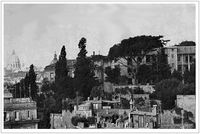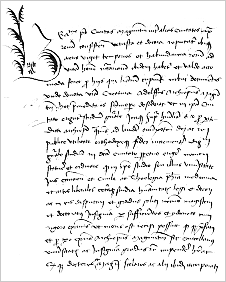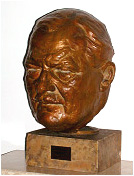
The German Historical Institute in Rome was founded in 1888 as the "Prussian Historical Station" (Preußische Historische Station), seven years after the opening of the Vatican Archives by Pope Leo XIII. Following the example set by France and Austria, there were attempts to establish a historical institute of the German Reich from 1883 onwards, but these failed and subsequently the largest German state of Prussia set up its own foundation, initially known as the "Historical Station" and from 1890 as the "Institute". From 1888 to 1903, under the leadership of Konrad Schottmüller (1888–1890), Ludwig Quidde (1890–1892; he won the Nobel Peace Prize in 1927), Walter Friedensburg (1892–1901) and Aloys Schulte (1901–1903), the two key tasks of the Institute were tackled and these are still ongoing today – publishing the Nuntiaturberichte aus Deutschland and the Repertorium Germanicum. Both are closely linked with the inexhaustible Vatican Archive.

Since 1898 the Institute has produced an academic journal and since 1905 it has published a book series.
Quellen und Forschungen aus italienischen Archiven und Bibliotheken
Bibliothek des Deutschen Historischen Instituts in Rom

From 1903 to 1936 the Institute was under the leadership of Paul F Kehr. He had been known since 1896 for his work collecting Italian papal documents up to 1198. The Institute's work was closely linked with the Göttinger Akademie's publication of Italia Pontificia. In addition to work being pursued in the Vatican Archives, Kehr gave the Institute the task of researching material about the history of the Holy Roman Empire that was stored in Italian and particularly Tuscan archives. This led in turn to cooperation with the Monumenta Germaniae Historica (Kaiserurkunden, Reichssachen, Constitutiones) and with the Istituto Storico Italiano per il Medio Evo
(Regesta Chartarum Italiae).
The two world wars and the difficult economic situation that followed inevitably interrupted the Institute’s work. It was partly thanks to the actions of Italian supporters that the Institute and its library avoided expropriation and on both occasions was able to make a new start (re-opening in 1924 and again in 1953). It was difficult to avoid closing the Institute during the worldwide economic crisis of the early 1930s. In 1935 it was handed over by Prussia to the German Reich and incorporated into the "Reichsinstitut für ältere deutsche Geschichtskunde" (Monumenta Germaniae Historica). In 1937 it was renamed the German Historical Institute in Rome and in 1938 it temporarily took over the Austrian Historical Institute.
After the Institute re-opened in 1953, Walther Holtzmann re-established old contacts and made new ones with Italian colleagues and work began again on projects that had been started by Kehr, particularly continuing with the Nuntiaturberichte, the Repertorium Germanicum and finishing Italia Pontificia. He promoted the establishment of the music history department in 1960, which soon held a significant position within Italian musical academia. The department published essays and monographs in the occasional publication Analecta musicologica and editions of musical works in Concentus musicus.
Between 1962 and 1972 Gerd Tellenbach broadened the remit of the Institute’s work and increased its effectiveness: more focus on the 19th century, research into the links between fascism and national socialism, re-establishing work on the history of the Holy Roman Empire in Tuscany (including publication of early medieval documents from the Imperial Monastery at Monte Amiata, which had been completed in the mean time), and running colloquia on medieval and modern historical themes and on music history.
Under Reinhard Elze (1972–1988) work began on computerising the Repertorium Germanicum. At the same time, there was an increase in work on the most recent history (publishing two periodicals by Jens Petersen, entitled Bibliographische Informationen and Storia e Critica). Since 1974, an annual "Rome Seminar" has taken place, in cooperation with professors, assistants and students from a different German university on each occasion, which since 1988 has continued in a different form as the Roman Studies Course. Furthermore, there are close links with the Italian-German Historical Institute in Trient, with the Arbeitsgemeinschaft für die neueste Geschichte Italiens, which was founded in 1973 by Wolfgang Schieder (from Köln) and is now under the direction of Christof Dipper (from Darmstadt), in cooperation with the Institute, and temporarily with the Institute of Medieval Canon Law in Berkeley, California, now Munich.
From 1988 to 2001 the Institute was under the leadership of Arnold Esch. Between May 2001 and September 2002, Alexander Koller temporarily lead the Institute.
In July 2002, the German Historical Institute in Rome, until then a subordinate department of the German Ministry of Education and Research, became part of the newly founded Stiftung Deutsche Geisteswissenschaftliche Institute im Ausland (DGIA - Foundation of German Humanities Institutes Abroad), together with 9 more humanities research institutes of the Federal Republic of Germany. In occasion of its 10th anniversary on 1 July 2012, the Foundation changed its name to Max Weber Stiftung – Deutsche Geisteswissenschaftliche Institute im Ausland.
From 2002 to 2012, Michael Matheus directed the Institute.
Since October 2012, Martin Baumeister holds office as Institute Director.

